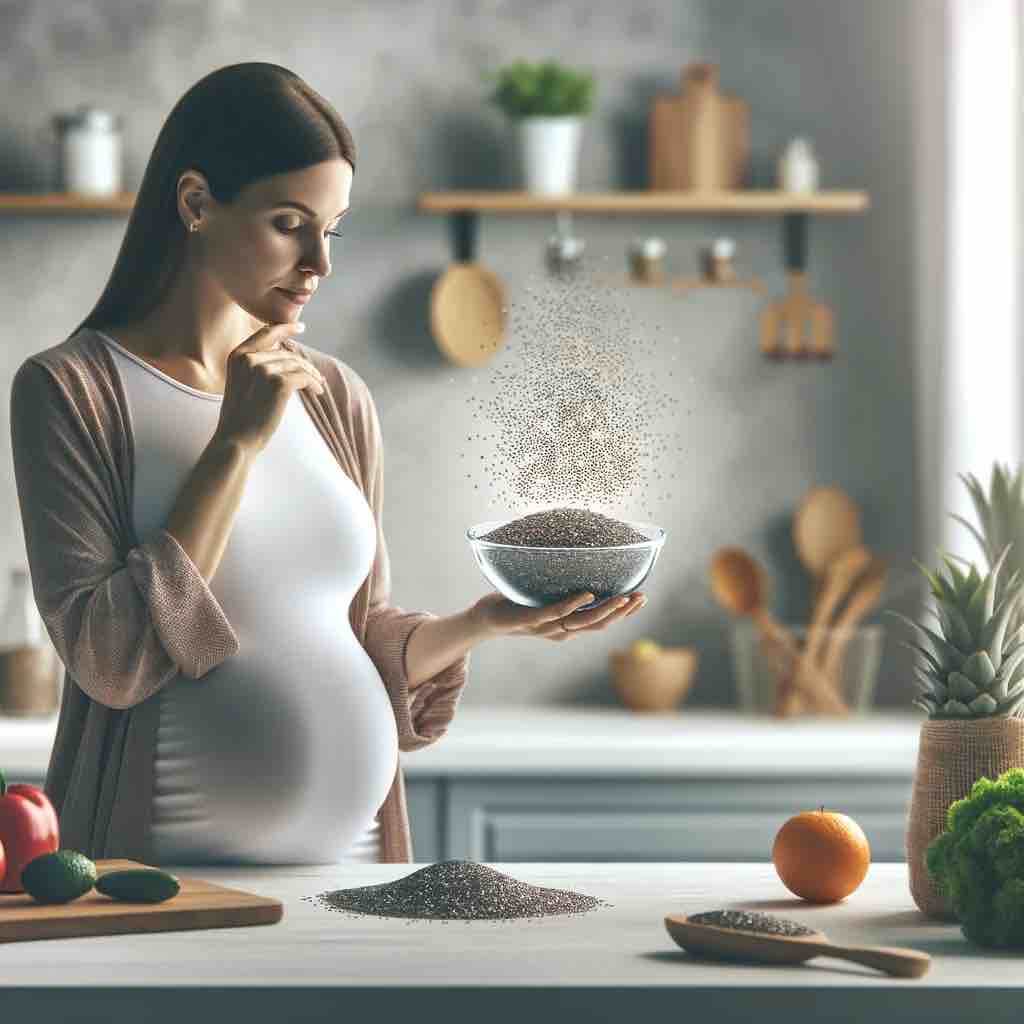
Introduction:
Did you know that what you eat during pregnancy doesn’t just nourish your body but also plays a pivotal role in your baby’s brain development? The journey of motherhood starts from the very moment you conceive, and so does the responsibility of fostering a healthy, intelligent little one. While the idea of shaping a future genius might seem overwhelming, it’s actually quite achievable with the right nutrition. In this article, we’ll explore 12 superfoods that are not only delicious but are packed with essential nutrients to support your baby’s cognitive development in the womb.
From the brain-boosting power of Omega-3s to the protective antioxidants found in colorful fruits, each of these foods offers a unique set of benefits for both you and your growing baby. Whether you’re a first-time mom or a seasoned parent, these insights will guide you through a nutritious pregnancy journey, paving the way for your baby’s bright future. So, let’s dive into the world of superfoods that are not just good for you but are a smart choice for your baby’s developing brain!
1. Eggs: The Brain-Boosting Powerhouse
Eggs are often hailed as nature’s multivitamin, and for good reason. They are a powerhouse of nutrients, including high-quality protein, vitamins, and minerals, essential for the healthy development of your baby. One of the most crucial nutrients found in eggs is choline, which plays a significant role in fetal brain development and helps prevent developmental abnormalities of the brain and spine.
Practical Tip: Start your day with a protein-rich breakfast of scrambled eggs or add a hard-boiled egg to your salad for a nutritious lunch. Remember, while eggs are incredibly beneficial, it’s best to consume them fully cooked to avoid any health risks.
2. Fatty Fish: Omega-3 for Brain Development
Fatty fish like salmon, mackerel, and sardines are rich in Omega-3 fatty acids, particularly DHA, which is vital for the development of your baby’s brain and eyes. These fatty acids are the building blocks of the brain and are crucial for cognitive and visual development.
Simple Recipe Idea: Grilled salmon with a squeeze of lemon is not only easy to prepare but also a delicious way to get your Omega-3s. If you’re not a fan of fish, consider Omega-3 supplements after consulting with your healthcare provider.
3. Almonds: Nuts for Brain Health
Almonds are a fantastic source of healthy fats, antioxidants, and vitamin E, which are important for your baby’s neurological development. They also provide essential nutrients like protein and magnesium, which support overall growth and development.
Creative Ways to Add Almonds: Sprinkle chopped almonds over your morning oatmeal or yogurt. Almond butter is also a great alternative to peanut butter and can be spread on whole-grain toast for a healthy snack.
4. Milk: Building Blocks for Growth
Milk is a vital source of calcium, which is necessary for the development of strong bones and teeth. It also provides high-quality protein and vitamin D, supporting overall fetal growth and development.
Addressing Lactose Intolerance: If you’re lactose intolerant, consider lactose-free milk or calcium-fortified plant-based alternatives like almond or soy milk. These can provide similar nutritional benefits without the discomfort.
5. Leafy Green Vegetables: Folic Acid Galore
Leafy greens such as spinach, kale, and broccoli are packed with folic acid, iron, and calcium. Folic acid is particularly important in the early stages of pregnancy to prevent neural tube defects and promote a healthy brain and spinal cord development.
Quick and Easy Recipe: Try a spinach and feta cheese omelet for a nutrient-packed breakfast or a kale salad for lunch. These greens can easily be incorporated into various meals, making them a versatile choice for your pregnancy diet.
6. Blueberries: Antioxidant-Rich Brain Food
Blueberries are a superfood hero, packed with antioxidants like flavonoids, which are known for their role in cognitive development. These tiny berries also offer a wealth of vitamin C and fiber, making them an excellent choice for pregnant women.
Delicious Blueberry Snack Idea: Blend blueberries into a smoothie or top your morning cereal with a handful of these nutritious berries. Not only do they add a burst of flavor, but they also provide essential nutrients for your baby’s brain health.
7. Oranges: Vitamin C for Healthy Development
Oranges are a fantastic source of vitamin C, crucial for the development of a healthy immune system for both mother and baby. This vitamin also plays a role in the absorption of iron, an important mineral for cognitive development.
Ways to Enjoy Oranges: Apart from enjoying them as a juicy snack, you can add orange slices to your salads or drink freshly squeezed orange juice for a refreshing nutrient boost.
8. Cheese: Calcium and Protein Power
Cheese is not only delicious but also a great source of calcium and protein, essential for fetal development. It’s important, however, to choose pasteurized cheese to avoid any potential health risks.
Cheese in Your Diet: Add cheese to sandwiches, salads, or as a topping on soups. Cottage cheese, in particular, can be a great addition to a fruit salad or as a standalone snack.
9. Sweet Potatoes: Beta-Carotene for Development
Sweet potatoes are rich in beta-carotene, which the body converts into vitamin A, vital for the healthy development of the baby’s eyes, bones, and skin. They are also a good source of fiber, which aids in digestion.
Tasty and Nutritious Recipe: Roasted sweet potatoes make for a simple yet delicious side dish. You can also mash them for a healthy version of mashed potatoes.
10. Pumpkin Seeds: A Nutrient-Dense Snack
Pumpkin seeds are a powerhouse of nutrients, including omega-3 and omega-6 fatty acids, iron, and protein, all of which are beneficial for your baby’s brain development.
Incorporating Pumpkin Seeds: Sprinkle them on your salad, yogurt, or blend them into a smoothie for an extra nutritional punch.
11. Yogurt: Probiotics and Calcium
Yogurt is an excellent source of calcium, which is essential for bone development, and probiotics, which support digestive health. It’s also a great source of protein.
Different Ways to Enjoy Yogurt: Have it as a snack with fruits and honey, or use it as a base for smoothies. Greek yogurt can be a healthier alternative due to its higher protein content.
12. Quinoa: A Complete Protein Source
Quinoa is a unique superfood, offering a complete protein profile, which is rare in plant-based foods. It’s also high in fiber, iron, and B-vitamins, essential for your baby’s overall development.
Quinoa in Meals: Use quinoa as a base for salads or as a healthier alternative to rice. It’s also great in soups or as a breakfast cereal substitute.
Conclusion:
Incorporating these 12 superfoods into your diet during pregnancy can significantly contribute to your baby’s brain development and overall health. Remember, while diet is crucial, it’s just one part of a healthy pregnancy. Always consult with your healthcare provider before making significant changes to your diet, especially during pregnancy.
Call to Action:
We’d love to hear from you! Share your favorite pregnancy superfood recipes or tips in the comments below. And if you found this article helpful, please share it with other expectant mothers in your circle.
10 FAQs and Answers:
- Q: How often should I eat these superfoods during my pregnancy? A: Aim to incorporate these superfoods into your daily diet. However, balance is key. Consult with your healthcare provider for personalized advice.
- Q: Can I get enough Omega-3 from plant sources if I don’t eat fish? A: Yes, flaxseeds, chia seeds, and walnuts are good plant-based sources of Omega-3. Supplements are also an option, but consult your doctor first.
- Q: Are there any risks associated with consuming too much vitamin A from sweet potatoes? A: While sweet potatoes are a healthy choice, excessive vitamin A intake can be harmful. Enjoy them in moderation as part of a balanced diet.
- Q: Is it safe to eat cheese during pregnancy? A: Yes, but make sure it’s made from pasteurized milk to avoid the risk of foodborne illnesses.
- Q: Can I replace regular milk with plant-based alternatives? A: Absolutely. Almond, soy, and oat milk are great alternatives, especially if they are fortified with calcium and vitamin D.
- Q: How can I include quinoa in my diet if I’ve never eaten it before? A: Quinoa can be used much like rice. It’s great in salads, as a side dish, or even as a breakfast cereal alternative.
- Q: Are there any superfoods to avoid during pregnancy? A: While not exactly superfoods, it’s advisable to avoid high-mercury fish, unpasteurized dairy, and excessive caffeine.
- Q: How important is it to have organic versions of these superfoods? A: Organic foods can reduce exposure to pesticides, but the most important factor is the nutritional content. If organic isn’t feasible, ensure your produce is well-washed.
- Q: Can eating these superfoods help with pregnancy symptoms like morning sickness? A: Foods like ginger and citrus fruits can help alleviate morning sickness. However, each woman’s experience is unique, so it’s best to find what works for you.
- Q: Should I take supplements for nutrients like folic acid and iron? A: Supplements can be beneficial, especially for nutrients like folic acid and iron, but it’s crucial to consult with your healthcare provider before starting any supplements.
Blog Tags: Pregnancy Nutrition, Superfoods for Pregnancy, Brain Development Foods, Healthy Pregnancy Diet, Omega-3 in Pregnancy, Folic Acid, Prenatal Health, Maternal Diet, Baby Brain Growth, Pregnancy Superfoods











